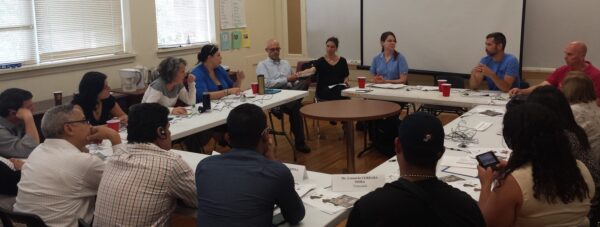Sustain Charlotte hosts sustainability discussion with Latin American visitors
Sustain Charlotte staff and board members met with eight Latin American professionals on Wednesday to discuss ideas for implementing sustainability programs in urban areas. We shared the story of why our Executive Director Shannon Binns founded Sustain Charlotte five years ago. Then we explained the goals and strategies for each of our major programs and initiatives. As we reviewed land cover maps showing how sprawl has dramatically altered our regional landscape over the past 40 years, several visitors shared that their countries or regions are also facing similar challenges. Poor land use decisions, over-dependence on private vehicles, and short-sighted planning are not problems unique to the United States.

Sustain Charlotte staff and board members discussed sustainability with Latin American visitors.
A major goal of the foreign exchange program is to provide the visitors with an overview of public and private sector efforts, policies and techniques used to address key environmental and developmental issues at the national, state, local and grassroots levels in the United States. Charlotte was the fourth stop for this group after Denver, Seattle, and Washington D.C. Their local host was the Citizen Diplomacy Program at International House.
The visitors came from Colombia, Costa Rica, Dominican Republic, Paraguay, Peru and Venezuela. Many professional fields were represented including journalism, government, academia, business, and non-profit. They were invited to the United States under the auspices of the Department of State’s International Visitor Leadership Program. We were joined by Sustain Charlotte board members Luis Matta and Bob McElfresh, who are both dedicated volunteers within Charlotte’s international community.
With the aid of translators, we had a fascinating conversation! Michelle Soto Mendez, a journalist for Costa Rica’s La Nacionnewspaper, said that sustainability non-profits in her country are almost exclusively focused on environmental issues. She told us that there just aren’t many non-profits working on urban sustainability issues, but that it is very important.
A strong theme that emerged during our discussion was how our nation prioritizes economic concerns above environmental or social well-being. That’s not the case in every other country. Leonardo Cerrada Mora, a municipal Councilman from Venezuela, told us that his country has taken a more comprehensive approach to decision-making, and as a result has been ranked the happiest country in South America by the UN’s Sustainable Development Solutions Network.
Across the globe, communities and countries are beginning to officially recognize the value of resident happiness. They’re setting measurable goals to increase it. We’re glad to see Charlotte’s elected officials becoming more vocal about the need to improve quality of life for residents. City Council’s Environment Committee’s draft Focus Area Plan includes “Improve Charlotte’s Gross Domestic Happiness Index” as a Community Indicator. We encourage Council to take that goal seriously and consider the long-termsocial, environmental, and economic impact of their decisions. Read our blog from April 7 to learn more.
Thanks for reading!
As a nonprofit, community support is essential for us to keep doing what we do — including providing free articles like this. If you found this article helpful, please consider supporting Sustain Charlotte.
Want to stay in the loop? Subscribe to our weekly newsletter and follow us on Instagram, Facebook, and Twitter.
